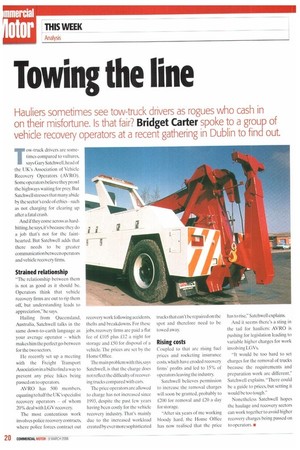Towing the line
Page 20

If you've noticed an error in this article please click here to report it so we can fix it.
Hauliers sometimes see tow-truck drivers as rogues who cash in on their misfortune. Is that fair? Bridget Carter spoke to a group of vehicle recovery operators at a recent gathering in Dublin to find out.
Tow-truck drivers are sometimes compared to vultures, says Gary Satchwell, head of the UK's Association of Vehicle Recovery Operators (AVRO). Some operators believe they prowl the highways waiting for prey. But Satchwell stresses that many abide by the sector's code of ethics such as not charging for clearing up after a fatal crash.
And if they come across as hardhitting, he says, it's because they do a job that's not for the fainthearted. But Satchwell adds that there needs to be greater communication between operators and vehicle recovery firms.
Strained relationship "The relationship between them is not as good as it should he. Operators think that vehicle recovery firms are out to rip them off, but understanding leads to appreciation," he says.
Hailing from Queensland, Australia, Satchwell talks in the same down-to-earth language as your average operator which makes him the perfect go-between for the two sectors.
He recently set up a meeting with the Freight Transport Association in a bid to find a way to prevent any price hikes being passed on to operators.
AVRO has 500 members, equating to half the UK's specialist recovery operators of whom 20% deal with LGV recovery.
The most contentious work involves police recovery contracts, where police forces contract out recovery work following accidents, thefts and breakdowns. For these jobs, recovery firms are paid a flat fee of £105 plus £12 a night for storage and £50 for disposal of a vehicle. The prices are set by the Home Office.
The main problem with this. says Satchwell, is that the charge does not reflect the difficulty of recovering trucks compared with cars.
The price operators are allowed to charge has not increased since 1993, despite the past few years having been costly for the vehicle recovery industry. That's mainly due to the increased workload created by ever more sophisticated trucks that can't be repaired on the spot and therefore need to be towed away.
Rising costs coupled to that are rising fuel prices and rocketing insurance costs, which have eroded recovery firms' profits and led to 15% of operators leaving the industry.
Satchwell believes permission to increase the removal charges will soon be granted, probably to £200 for removal and £20 a day for storage.
"After six years of me working bloody hard, the Home Office has now realised that the price has to rise," Satchwell explains.
And it seems there's a sting in the tail for hauliers: AVRO is pushing for legislation leading to variable higher charges for work involving LGVs.
"It would be too hard to set charges for the removal of trucks because the requirements and preparation work arc different," Satchwell explains. "There could be a guide to prices, but setting it would be too tough."
Nonetheless Satchwell hopes the haulage and recovery sectors can work together to avoid higher recovery charges being passed on to operators. •
































































































































































































